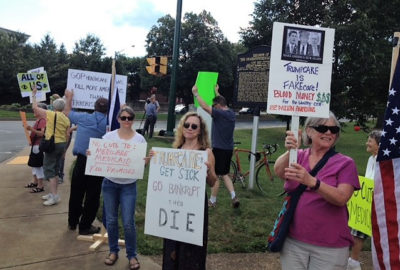While Virginians can rest a little easier today as the latest Republican assault on the Affordable Care Act (ACA) has been defeated, challenges remain, and could find their way into the next General Assembly session.
Since Donald Trump’s inauguration as President in January, Virginians have been dodging bullets from Washington, D.C., as the White House and Republicans in the U.S. House and Senate propose policy after policy, which, if enacted, would dramatically impact our citizens, particularly those who are most disadvantaged.
Many citizens have focused intently on the Russia probe, Trump’s tweets, his travel ban, his treatment of our allies, his boorish behavior, his attacks on his own Attorney General, on transgender military personnel, and even his not-so-subtle efforts to undermine the 1st Amendment. But while we are justifiably concerned about all of these issues, Virginians and our economic security are put even more at risk from other policies that Trump and his allies are advocating, particularly in the health care arena. Virginia Republicans, from Ed Gillespie to members of the House of Delegates, have either fully embraced these hurtful policies, or have tacitly done so by remaining silent.
Trying to take the “care” out of health care
Candidate Trump promised to repeal the Affordable Care Act (ACA) on “day one” of his Presidency. But President Trump was not able to force immediate action, and the fact that he failed to do so has saved Virginians considerable pain and insecurity to date.
Earlier this year, Virginia House Democrats challenged our Republican colleagues to join us in a letter to our Congressional delegation, expressing concern that repealing the Affordable Care Act without a replacement would hurt Virginians significantly and create a huge deficit in our state budget. Not one Republican delegate signed the letter, and Republicans in Congress kept pushing. In March, the Republican-controlled House ultimately rejected a straight repeal, and instead moved forward with a “repeal and replace” plan, which also placed Virginians at substantial risk, jeopardizing health insurance for over 500,000 Virginians (23 million Americans, according to the nonpartisan Congressional Budget Office) and reducing support for our state’s Medicaid program, placing thousands of elderly and disabled who rely on it at serious risk. What did Virginia Republicans say about this measure? Nothing!

It took two tries, but the U.S. House of Representatives passed their bill. The Trump White House celebrated, and the bill went to the Senate, where Republicans generated an even a more draconian proposal. Developed in secret, it received almost no support from those who either understand health policy or practice in the area. Physicians and nurses, hospitals, and even the insurance industry opposed the Senate plan. The public rose up and stated unequivocally that this was not a plan that they could embrace.
Nonetheless, Senate Republicans regrouped around a hope of finding 50 votes for straight repeal. This would mean insurance companies could discriminate against Virginians with preexisting conditions and plans would no longer need to provide for “essential” health care benefits. Insurance markets would likely head into a tailspin. And where were Virginia Republicans on this issue? Silent!
Straight repeal failed and the Senate then considered “skinny repeal,” a measure that Majority Leader Mitch McConnell admitted was no more than a partisan maneuver to keep the assault on the ACA alive via a conference committee with the House. Without the courage of several Senate Republicans who joined their Democratic colleagues, the “skinny repeal” measure could have moved forward. Last Friday morning, this effort also failed, and the Republican attack on the ACA is over, at least for the moment.
What will Washington try next?
While the one-party legislative repeal effort has not been successful, Virginians are not out of the woods. Trump can undermine the ACA through executive order action and Republicans can try to destroy it through the budget process. Paul Ryan’s proposed budget would cut $487 billion in Medicare spending over the next 10 years, and could cost Virginia as much as $1 billion in Medicaid funding per year over the next decade. If the insurance marketplaces are undercut by machinations in Washington, Virginians may be left with fewer options to obtain coverage than they have at present. That is why we need to continue to speak up and demand that representatives advocate for our citizens. And we need to engage with this fall’s election, which is the first about the direction of the country in the aftermath of Trump. Ed Gillespie and Republican incumbents have thoroughly embraced repeal of the ACA; Virginians should show them that this approach will not work in our Commonwealth.
